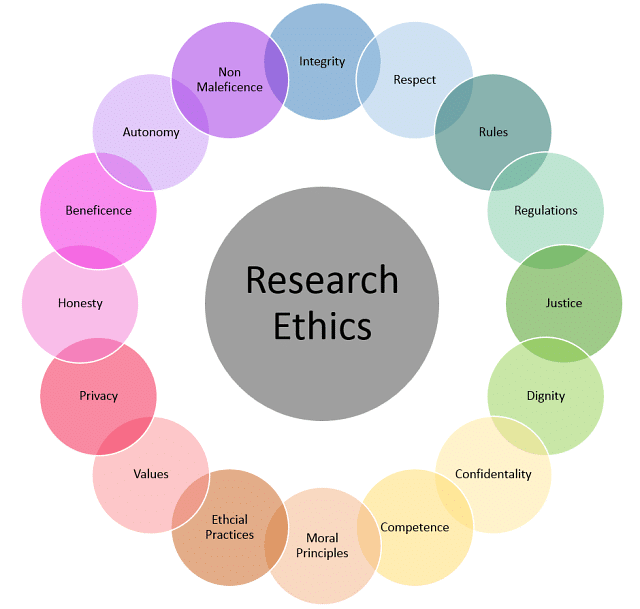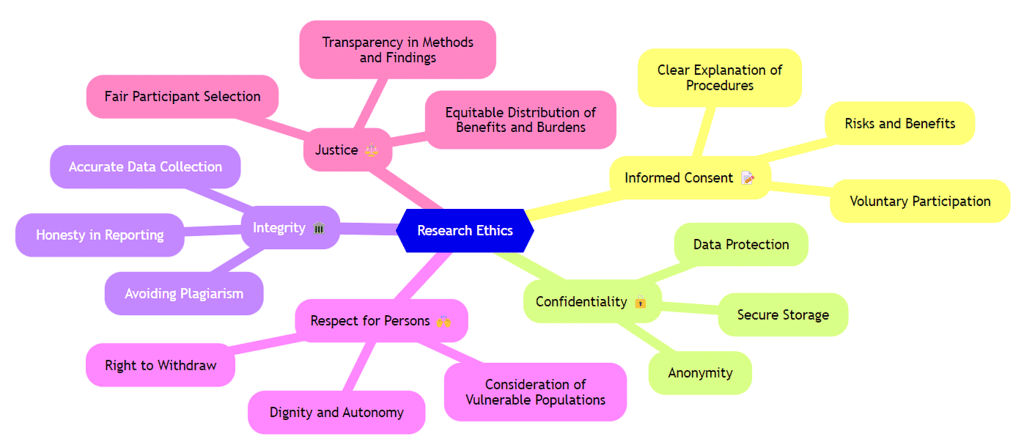Research Ethics & Principles - Research Aptitude Notes
| Table of contents |

|
| Research Ethics |

|
| Objectives of Research Ethics |

|
| Components of Ethical Research |

|
| Main Approaches to Research Ethics |

|
| Common Errors in Research |

|
Research Ethics
Research involving human subjects or participants raises unique and complex ethical, legal, social, and political issues. 
Research ethics refers to a diverse set of values, norms, and institutional regulations that help constitute and regulate scientific activity.
Objectives of Research Ethics
The objectives of research ethics are multifaceted, aiming to:
- Protect Human Participants: This involves ensuring that individuals involved in research are treated ethically and their rights and well-being are safeguarded throughout the research process.
- Serve the Interests of Society: Research should contribute positively to the advancement of knowledge and benefit individuals, communities, and society as a whole.
- Evaluate Ethical Soundness: Research activities must be scrutinized for ethical integrity, including the management of risks, protection of confidentiality, and the process of obtaining informed consent from participants.

Ethical Considerations in Vulnerable Populations
Research involving vulnerable populations, such as children, individuals with cognitive disabilities, institutionalized persons, or marginalized groups, requires special ethical considerations. These populations may have limited autonomy or capacity to consent, requiring researchers to implement additional safeguards to protect their rights and welfare. Issues also arise in international research, genetic studies, and privacy protection in the digital age.
Components of Ethical Research
Ethical research is characterized by several key components:
- Voluntary Participation: Participants must give informed consent voluntarily, fully understanding the research procedures, potential risks, and benefits involved. Consent should be documented in writing.
- Non-Harm Principle: Researchers must ensure that the research design minimizes any potential harm to participants, both physical and psychological.
- Confidentiality: Participants' identities and personal information must be kept confidential to protect their privacy and prevent unauthorized disclosure.
- Respect for Autonomy: Participants have the right to make independent decisions regarding their involvement in research without coercion or undue influence.
Main Approaches to Research Ethics
Researchers typically adhere to one of three primary approaches to ethical decision-making:
- Deontological Approach: Ethical decisions are based on universal principles and duties. Researchers adhere to ethical guidelines and rules regardless of the consequences.
- Utilitarian Approach: Decisions are evaluated based on maximizing benefits and minimizing harms. Researchers weigh the potential risks and benefits of their studies to determine ethical acceptability.
- Ethical Relativism Approach: Ethics are seen as relative to specific cultures, contexts, or times. This approach acknowledges that ethical standards may vary across different societies or periods.
Suggestions for Ethical Research
To conduct research ethically, researchers should:
- Maintain Objectivity: Avoid biases and ensure objectivity throughout the research process.
- Use Appropriate Methodologies: Employ suitable and unbiased research methodologies that are appropriate for the research questions and objectives.
- Ensure Honesty and Transparency: Report findings honestly and transparently, including methods used, data collected, and results obtained.
- Exercise Care and Rigor: Conduct research with care and rigor to minimize errors and ensure the reliability and validity of findings.
- Respect Participants and Intellectual Property: Respect participants' rights and intellectual property, ensuring proper attribution and permissions for any borrowed materials or ideas.
- Protect Confidentiality: Safeguard participants' confidentiality and privacy throughout the research process.
- Consider Potential Impacts: Anticipate and mitigate any potential negative impacts of the research on participants, communities, or society at large.
Common Errors in Research
Common pitfalls in research include:
- Methodological Confusion: Selecting inappropriate research methods or misinterpreting data collection and analysis techniques.
- Bias and Prejudice: Introducing biases or preconceived notions into the research process, potentially skewing results.
- Oversights and Inaccuracies: Failing to detect and correct small errors during data collection, analysis, or manuscript preparation.
- Poorly Defined Research Questions: Formulating research questions that are vague or not adequately researchable.
- Population Specification Errors: Misidentifying or inadequately defining the target population for study, leading to skewed results or misinterpretations.
By adhering to ethical guidelines and principles, researchers can uphold the integrity of their work, contribute responsibly to scientific knowledge, and ensure that research benefits both individuals and society ethically and morally.
|
12 videos|42 docs|9 tests
|
FAQs on Research Ethics & Principles - Research Aptitude Notes
| 1. What are the key principles of research ethics? |  |
| 2. Why is it important to follow research ethics guidelines? |  |
| 3. How can researchers ensure informed consent from participants? |  |
| 4. What are some common ethical dilemmas in research studies? |  |
| 5. How can research misconduct be prevented and addressed? |  |















